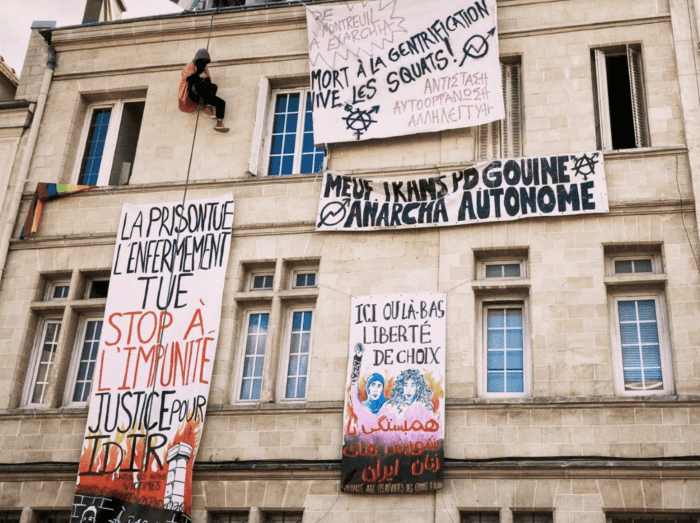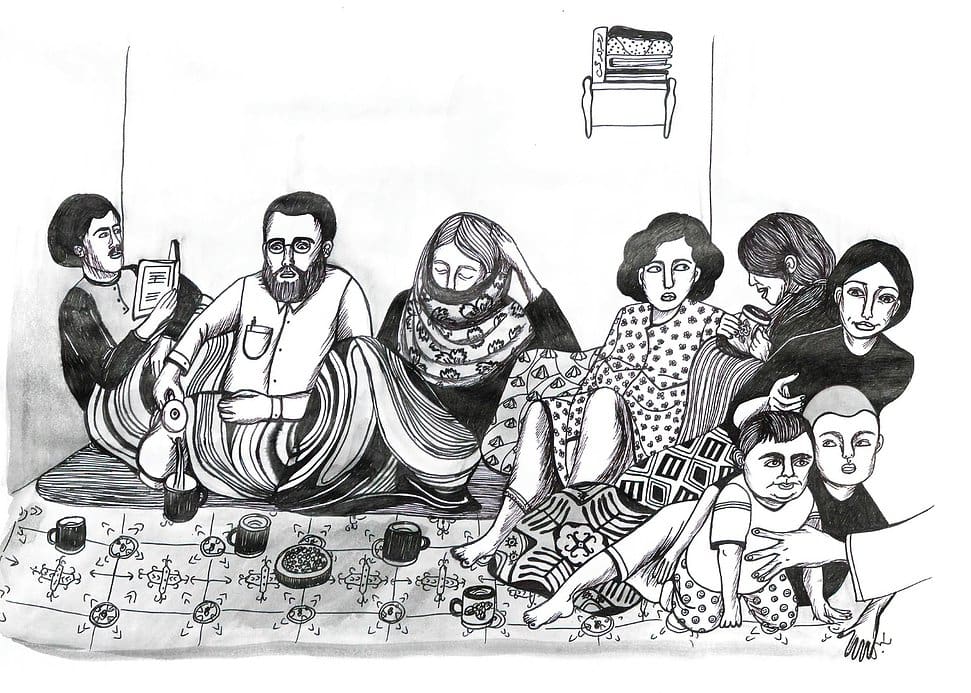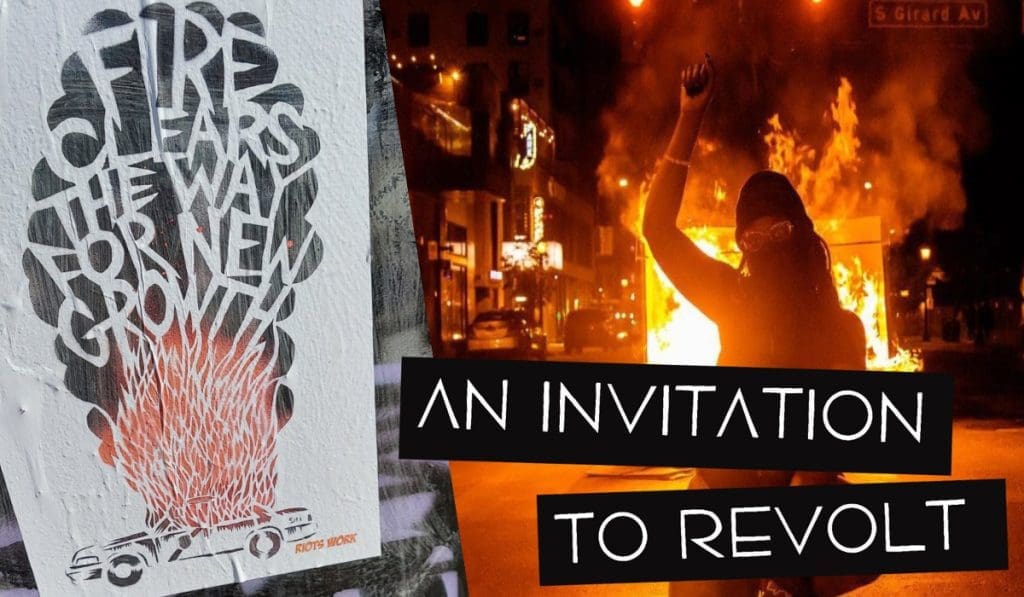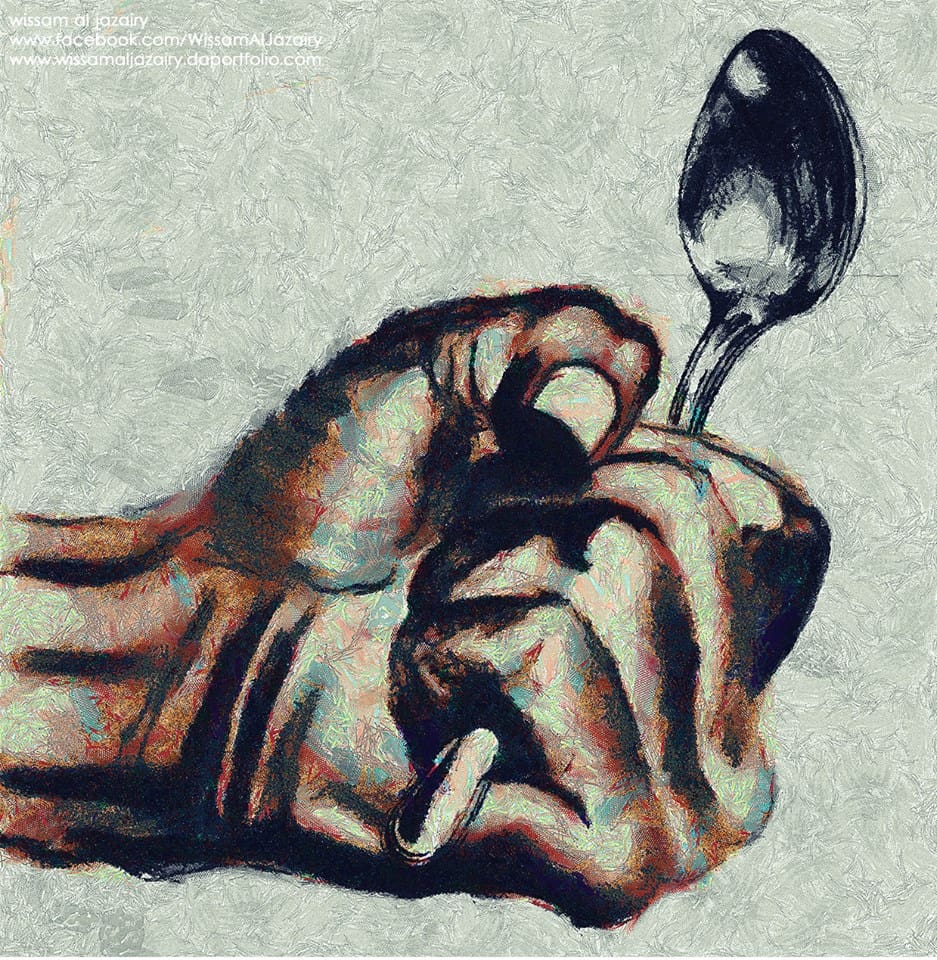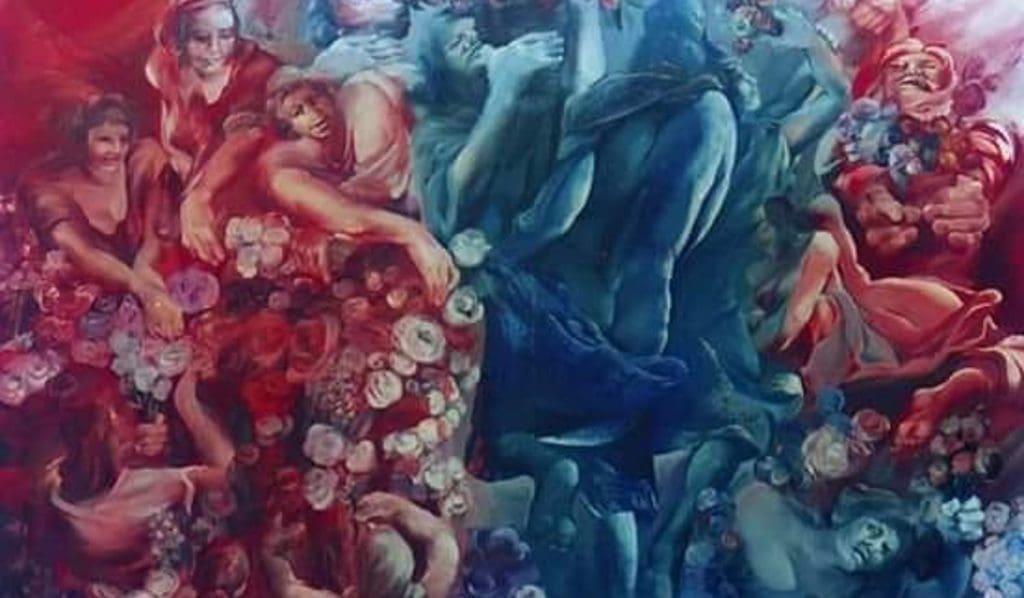Antinote: This piece was written in November 2022. Some of the active struggles mentioned have evolved since the time of writing.
The People Want
A reflection on international solidarity in late 2022
by an anonymous author for a zine titled “Revolutionary Advent” (Minneapolis, print only)
9 January 2023
الشعب يريد إسقاط النظام / The People want the fall of the regime
originating in Tunisia at the birth of 2011 Arab Spring, this protest slogan fanned revolutionary flames across uprising after uprising throughout the entire SWANA region
Revolution in every country / Revolution Everywhere
feminist protest slogan chanted during Lebanon’s October Uprising in 2019
Everything for Everyone, Nothing for Ourselves / Todo Para Todos, Nada Para Nosotros
Zapatista community governance principle
***
In late October 2022, the Syrian Canteen of Montreuil hosted activists, academics, journalists, and other comrades from around the globe for a week of workshops, presentations, shared meals and socializing. Included in this ‘strategy meeting’ were planning workshops for panel discussions that would take place at the subsequent weekend’s fourth annual public festival: Les Peuples Veulent | الشعوب تريد| The Peoples Want.
In addition to diasporic/exiled participants (mostly of SWANA origin), friends came to the gathering from Lebanon, Palestine, Chile, Colombia, Mali, Sri Lanka, Bulgaria, Ukraine, Iraq, Sudan, Congo, Tunisia, Mexico, the US, Romania, and more. After almost two weeks of strategizing and sharing life with revolutionaries from vastly different contexts and struggles, I came home with a sense of certainty I’d previously only dreamed of: amidst all of our current climate, economic, and political crises, there are real, ordinary people working and fighting for grassroots social change in every corner of the Earth. We are not alone.
The invitation we received from the Syrian Canteen spoke eloquently about their intentions for the space they were opening. Here are a few excerpts that sum up the spirit of this gathering:
“We participants, children and friends of the Syrian Revolution, we found ourselves after a long and difficult struggle, with a desire for the future: to never abandon, no matter in which geography, the just revolt of a people. In the footsteps of the Zapatistas and the feminists, we have begun to weave a network of planetary connections. Not as an abstract ethics, but as a survival strategy. We know that we come from different territories, with their own dynamics, complexities and histories. But we also know how our fights resonate, how our revolts utter the same cries, how we recognize ourselves in our doubts and in our rage. We defend an internationalism from below, anchored in a myriad of spaces and territories that decide to govern themselves. An internationalism of peoples who dream of seeing more and more territories liberated from capital and tyrants. We always dream of victory. In the paths of the battles that we fight everywhere, we want to draw, together, new horizons.”
At this gathering, our friends invited us to dream up what those horizons might actually look like. They asked us: what do the people want?
Just weeks before we landed in Montreuil, a popular feminist revolt was sparked in Iran after the murder of Jina Amini by the Iranian ‘Morality Police’ for violating strict mandatory veiling laws. This and many other popular revolts currently underway lit a reminiscent fire in our eyes – against all odds, even under the most repressive circumstances, the people are rising up. The people refuse to have their dignity degraded any further without protest. The people want to eat. The people want to sleep soundly. The people want a world without censorship, torture, senseless bombing, and mass displacement for the sake of a few greedy men’s egos. It goes without saying, unfortunately, that these kinds of tactics are still being used to violently suppress current revolutionary efforts in Iran. The fire in our eyes is one of inspiration, elation, but also crushing heartache for all the suffering we know has been and will be inflicted on civilians in Iran, as it has in Syria and elsewhere.
For anyone who’s followed the Syrian Revolution and its subsequent ongoing war, it will come as no surprise that it was the children of the revolution who understood the urgency of this moment, and called us together. After all, the Syrian conflict sits at a crossroads of global empires. Everyday people demanding their right to dignity and life have been punished by the cruel, heartless political maneuvering of international power brokers, from the US to Turkey to Russia to Iran to the Gulf States, on top of their very own ruthless dictator (Bashar al-Assad), as well as ISIS, and other militant groups protecting their own interests and punishing dissent.
Many people look at this conflict and quickly despair. This is an impossible situation. There is no sense to be made of it. We know where this train of thought ends: it’s easier to look away. But what if, instead of abandoning our friends to such a cruel fate, we looked more closely? What if we drew near and sought out the cracks in this many-layered conflict of empire? The Syrian Canteen of Montreuil issued this call, and what we saw at The Peoples Want 4.0 was that call answered by a powerful showing of transnational solidarity from the grassroots. Different as we may have been, attendees embodied a spirit of generosity, humility, and authenticity that allowed this gathering to foster deep, meaningful, and lasting ties between comrades worldwide.
To give a very broad picture of what we were working on, these were some of the topics presented in panel discussions at the public festival: Building grassroots organizations, International feminism, Organizing in times of collapse, Decolonial liberations, Syrian Local Councils, Food autonomy, Wars and Revolts in Eastern Europe, Anti-Imperialisms, Organizing against police, and Agricultural knowledge in exile. There were also screenings of videos by grassroots media collectives in Egypt, Ukraine, and Syria, and a screening of the film Mapping Lessons.
For the public festival, I was honored to be invited onto a radio panel, alongside comrades from the Defend Atlanta Forest movement as well as from the Organización Popular Francisco Villa de la Izquierda Independiente of Mexico City, where we shared stories and reflections on the topic of ‘Organizing against and without police’. We had a cautiously hopeful conversation, looking not only to show why abolishing the police is necessary for human autonomy and freedom, but also how people are building alternative realities already.
First our comrades from the Defend Atlanta Forest movement spoke about their current fight to protect 300 acres of urban forest from being razed and replaced with a large ‘mock city’ – a training facility for police officers designed as a playground of fake urban scenarios in a life sized model of a city (it is as dystopian as it sounds). An additional 170 acres of that same forest are at risk of being cleared for a major entertainment studio slated to become a “new Hollywood”. This movement has been largely successful in protecting the forest so far, and it stands as both a symbolic and literal fight against the breeding grounds of capitalist empire.
Next I talked about the community that’s taken hold in a church on the Southside of Minneapolis in the wake of the pandemic, the police murder of George Floyd, the subsequent uprisings, the housing crisis, the opioid epidemic, economic instability, and climate collapse. I explained how our community banded together under a newly popular understanding that ‘we take care of us’ and ‘we keep us safe’ – that we, the people, could meet each other’s needs, and that in doing so, we could build a resilient community that makes the police irrelevant and continues the centuries-long fight against racism and colonialism in our civil society. The result of these efforts was a beautiful collaboration in our church building, bringing together food solidarity services, healing services, religious and spiritual communities, harm reduction work for drug users and encampment communities, arts and culture programming, protest and street support, community meetings and more.
I was heartened to hear about how our comrades from Mexico City were modeling the path forward for us. In their autonomous village, they have an appointed community defense committee that rotates responsibilities for keeping watch and helping resolve conflicts within the community. When someone in the community inflicts harm on someone else, this committee is responsible for holding that person accountable, separating them and reflecting with them on their actions. To re-join the community, they are required to do some form of community service, and depending on what they did, to research a topic of political education, and to present this to the community as a part of their healing and learning.
Our conversation ended on a fierce note, with panelists emphasizing that in order to build a world without police and state repression, all of our current systems have to change. Capitalism, the state, the prison system, and the police need to be abolished. Imperial forces everywhere have to fall. I firmly agreed, though I was hesitant to leave things on such a destructive note – so with a nod to our comrades from Mexico, I pointed out that we don’t have to wait until things collapse to build the world we want to live in. In fact, there are people, everywhere, experimenting with and living these ideals out. It’s already happening.
***
As the week-long strategy meeting came to a close, I skipped out on a presentation to enjoy the unseasonably nice weather. I’d been staying at a house directly adjacent to a beautiful park, host to a small forest and a large, sectioned-off area reserved for ecological restoration, complete with a couple of cows and a herd of goats. On my walk in the park, I reflected on the power of this particular community in this particular neighborhood hosting all of these revolutionaries at once. Montreuil is just outside of Paris, connected to the city by Metro and a plethora of buses. It is a bustling neighborhood of immigrants and refugees, many of whom are of West African and SWANA origin. There was a friendly and familiar atmosphere, and there was a fiery energy to the local culture. For example, there is a strong organizing scene in the undocumented community, as well as in housing fights – squats are regularly opened and maintained for months to years at a time. There are robust social centers, anarchist bookstores, and restaurants that taste like home.
We spent a lot of time at A.E.R.I., a social center that calls itself a ‘real utopia’, hosting radical political organizing groups, alongside a bakery, French and Arabic lessons, a radio station, introductory coding workshops, printmaking, Theater of the Oppressed, and more. A number of the political organizing groups host canteens – they take on cooking a big meal once a week for anyone who comes in the door, and people come together to eat at “free price”, meaning pay what you can or eat for free. This is where the Syrian Canteen is housed.
An essential part of the gathering was how we ate together throughout the week. All of the canteens pitched in extra and fed us generously, with incredibly delicious food. After sessions broke, we would pile into the dining room, alight with reflections on our workshops, ready to meet new people, but also hungry and tired from travel, jetlag, and constant looping translations of four different languages at once. The cooks’ love and skill filled us up, giving us a chance to connect over our most basic needs and pleasures – food and good company.
Reflecting on this as I walked, I found a peaceful enclosure at the top of a hill and sat down on a very tall bench, swinging my legs around as I watched the goats resting. The wind was dancing in gusts, like it does on those oddly warm fall days – fussy, like a baby with a fever. The browning leaves on the trees shuddered and shook and flew. Still, I could hear silence in the intervals. I noticed how watching the leaves shake soothed me, my vision softening for the first time this week. So I decided to let my eyes close. The world dropped out from around me as I focused in on what this gathering had brought together energetically and spiritually. When I felt it, I was shaken to my core. It was simple – nothing elaborate or grand or ceremonious. I felt a pulse. A steady, deep, powerful pulse – a kind of heartbeat, or drumbeat… It took my breath away.
Periodically throughout the rest of the gathering and festival, I felt this heartbeat pulsing. It swelled and receded as I tuned in and out of this plane of awareness, fading a little into the noise of the public festival and reemerging with force as the whole gathering came to a close. The end of our time together was marked by a grief ritual, organized and collectively imagined by attendees as a way to honor the fallen, the martyred and the disappeared from all of our different struggles for liberation. With candles, speeches, songs and chants we invited the dead to sit with us in this public square, to hear our tender words and prayers for them as we set our sights on our journeys home, back to our respective lives and struggles.
As our friends dispersed the following day, I could feel that heartbeat once again. We each took a little piece of this gathering with us, and as we returned to our lives, that pulsing energy followed us. I couldn’t tell you what exactly that heartbeat was, but I know how life-affirming this gathering was for me and my new friends. It is so easy to despair from our own corners of the world, watching forces of death ravaging the Earth. But coming together like this, we made real for one another that there are indeed brilliant, kind, caring and creative people literally everywhere fighting back against all odds, fighting with forces of life, fighting for what the people want. Maybe that heartbeat was new hope – new, real belief that another world is possible, and that the people, everywhere, are bringing that world to life. The revolution is coming, and it’s already here.
Featured image: A longstanding squat in Montreuil
Reprinted with permission from the author.

